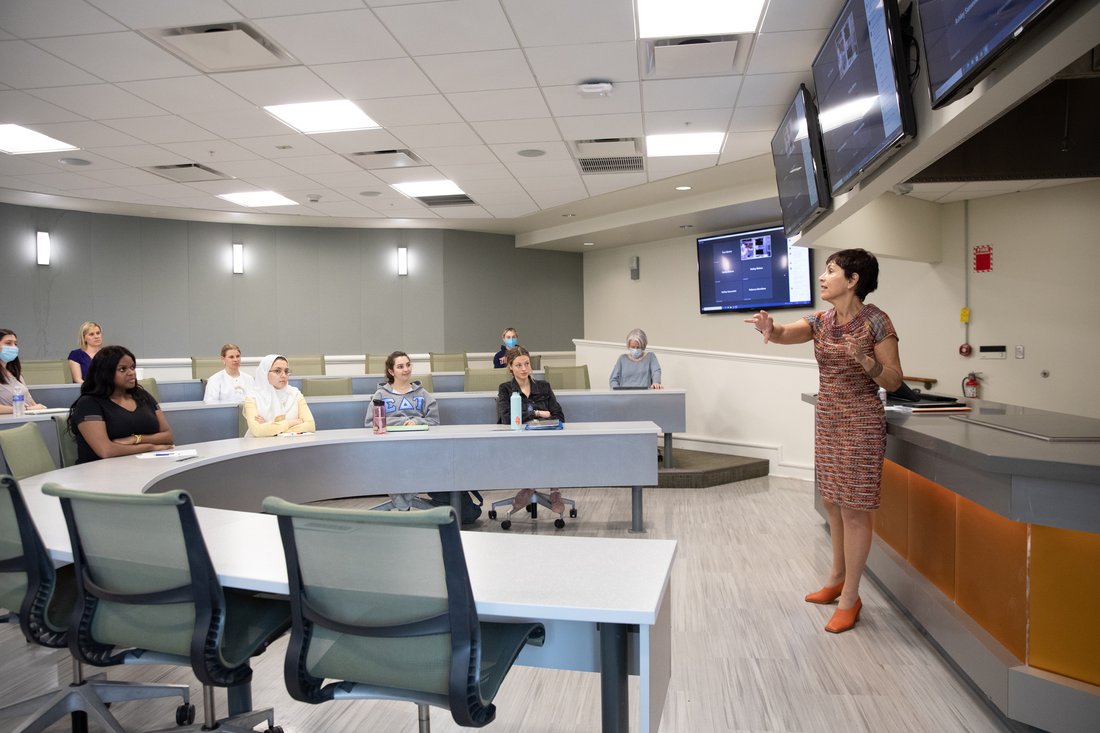
David B. Falk College of Sport
Curriculum
The Nutrition B.S. includes coursework in:
- Sciences: chemistry, biology, anatomy, physiology and biochemistry.
- Food: safety, science, systems and meal management.
Students also study nutrition in the health and lifespan, clinical nutrition therapy, community nutrition, nutrition education and counseling.
Sample courses include:
- Nutrition in the Lifespan
- Research and Evaluation in Nutrition
- Nutrition Leadership and Management
- Nutrition Counseling
The Nutrition B.S. prepares alumni to work in a variety of health and health promotion fields, many as registered dietitians. The Nutrition Science B.S. explores the biological and physical sciences to prepare alumni for postgraduate work in medicine, dentistry, education or health care, or to work for major food or pharmaceutical companies.
The Didactic Program in Dietetics at Syracuse University is accredited by the Accreditation Council for Education in Nutrition and Dietetics (ACEND) of the Academy of Nutrition and Dietetics (120 South Riverside Plaza, Suite 2190, Chicago, IL 60606-6995, 1.800.877.1600 ×5400). Our program is granted full accreditation through June 30, 2029.
Program outcomes data are available upon request.
Learn more about estimated expenses and financial aid:
The Nutrition Science, M.A. program is for students who are seeking to become entry-level Registered Dietitian Nutritionists (RDN), have earned a bachelor’s degree, and have completed course pre-requisite requirements or have earned a verification statement from an accredited didactic program in dietetics (DPD). For information about the DPD process, visit the Didactic Program in Dietetics (DPD) Handbook.
Licensure/Certification: In most states, graduates also must obtain licensure or certification to practice. For more information about state licensure requirements visit the Academy of Nutrition and Dietetics website.
Stay up to date in dietetics through continuing education. After passing the national exam and earning the credential, a RDN stays up to date on the latest research, recommendations and best practices to maintain their credential.
For more information about educational pathways to become a RDN visit the Academy of Nutrition and Dietetics website.
Extracurricular Opportunities
Practice Nutrition in the Community
Take nutrition to the local community by joining community partnership programs through the Syracuse University Shaw Center:
- Provide tutoring and nutrition education to elementary school students with Books & Cooks.
- Provide hands-on, nutrition-focused STEM lessons to high schoolers with Food Busters.
- Teach nutritious food choices and cooking skills to high schoolers with Cooking on the Hillside.
On campus, Syracuse University is home to more than 300 extracurricular groups, including nutrition student-led organizations such as Nutrition Education and Promotion Association (NEPA).
Experience Nutrition and Food Around the World
Syracuse University Abroad consistently ranks among the highest-quality international study programs in the country. Syracuse offers short- and long-term options in more than 60 countries, including internships, community engagement projects, and language study at all levels. In nutrition, you can study health care and families in India, food and culture in Italy, drug policy in the Netherlands, health education in South Africa, health policy in Switzerland, and social policy and public health in the United Kingdom, to name a few.
Make Your Mark in Research
As a nutrition student, you can engage in independent and faculty mentored research projects. Gain experience collecting and analyzing data. You can even publish as an author or co-author on scholarly articles and present your findings at conferences.
Hone your skills in on-campus labs using medical-grade equipment and technology that mirrors—or exceeds—what is found in medical facilities, professional sports, the military, and health and wellness settings. Our Nutrition Assessment, Consultation and Education (ACE) Center is a hands-on learning laboratory to prepare students with traditional and emerging professional competencies critical to effective nutrition practice.
Launch Your Career in Nutrition
Most commonly, our students choose to become registered dietitian nutritionists (RDNs).
Alternatively, the nutrition science B.S. is also an excellent foundation for other graduate education, such as:
- Allied health: Medicine, dentistry, physical therapy, and others.
- Biomedical research.
- Pharmaceuticals.
Or you might choose to pursue entry-level positions in:
- Business: Medical and food science research and development, quality control, employee wellness programming.
- Research and education: Nutrition, biomedical, metabolic, or food science research, teaching, curriculum development, program administration.
- Food and nutrition management: Food services, wellness programming, nutrition planning, health and lifestyle coaching, agriculture.
Learn more about this program

